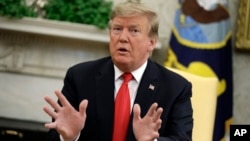U.S. President Donald Trump offered mixed signals Tuesday on whether he plans to close the U.S. southern border with Mexico to thwart the surge of undocumented migrants trying to seek asylum in the United States.
"After many years (decades), Mexico is apprehending large numbers of people at their Southern Border, mostly from Guatemala, Honduras and El Salvador," President Donald Trump said Tuesday on Twitter, days after he accused Mexico of doing nothing to stem the flow of migrants heading to the United States and threatening to close the border if it did not immediately step up enforcement.
No border closing decision has been made, and Trump later said he is ready to close it if he feels he has to.
"I'm totally prepared to do it," Trump said at the White House.
The U.S. Chamber of Commerce said Monday that nearly $1.7 billion of goods and services flow across the U.S.-Mexico border each day, and nearly half a million legal workers, students, shoppers and tourists cross the dividing line between the two countries, as well.
"Sure, it would have a negative effect on the economy," Trump said of a possible border closing. "But security is what's more important. Security is more important to me than trade."
Trump spokeswoman Sarah Sanders said U.S. officials are "looking at all options" whether to close entry ports from Mexico and what the impact would be. Sanders said the White House's Council of Economic Advisers is studying the impact of closing different ports of entry.
She said U.S. officials see Mexico "stepping up and taking a greater sense of responsibility" for the surge of immigrants, about 100,000 last month, mostly from Central America, who entered the United States to request asylum to escape poverty and violence in their homelands.
"They have started to do a significant amount more," Sanders said of Mexico. "We've seen them take a larger number of individuals" and hold those who have asylum claims in Mexico while they are being processed in the United States.
"We've also seen them stop more people from coming across the border so that they aren't even entering into the United States," she said. "So those two things are certainly helpful and we'd like to see them continue."






